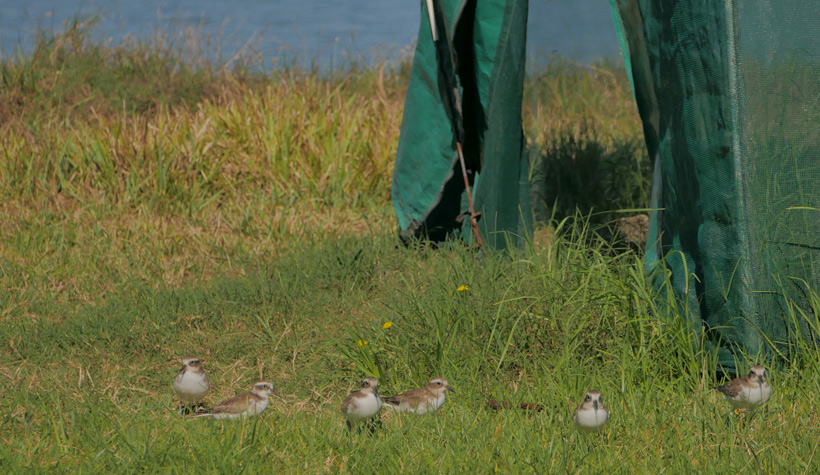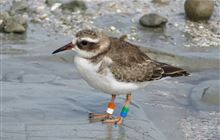Rare shore plover/tūturuatu released on Motutapu
Archived content: This media release was accurate on the date of publication.
Introduction
Fifteen shore plover, have been released on pest-free Motutapu Island to help secure the survival of this critically endangered native bird.Date: 11 April 2019
The birds have been released from two temporary aviaries on Motutapu in the Hauraki Gulf Marine Park.
There are just 245 shore plover in total, including 17 resident on Motutapu, which is connected to Rangitoto by a short bridge.
Motutapu and Rangitoto were declared free of rats, stoats, possums and other introduced predators in 2011.This made the islands safe for endangered native wildlife.

Six juvenile shore plover released from a temporary aviary on pest-free Motutapu island
Image: Myron Manickum | DOC
Shore plover were first released on Motutapu in 2012, as part of a DOC-led recovery programme to bring the species back from the brink of extinction.
Seven of the shore plover released on Motutapu were bred and raised at The Isaac Conservation and Wildlife Trust in Christchurch. The other eight were bred and raised at Pūkaha National Wildlife Centre, in Wairarapa.
“The Isaac Conservation and Wildlife Trust and Pūkaha National Wildlife Centre have played a major part in keeping shore plover from extinction,” says DOC Shore Plover Specialist Group Lead Dave Houston.
“They’ve been breeding and raising shore plover chicks for more than 20 years and have supplied more than 500 juvenile birds for release on pest-free islands.”
The shore plover released on Motutapu were flown to Auckland from Christchurch and Palmerston North by Air New Zealand as part of the airline’s conservation partnership with DOC.
To help save threatened native species, Air New Zealand has flown 3000 individual native birds and other native wildlife on domestic passenger flights since partnering with DOC in 2012.
Shore plover were once widespread along the coast of the North and South Islands. But rats, feral cats and other introduced predators almost wiped out the species.
By 1990, there were only 130 shore plover, all living on pest-free Rangatira Island in the Chatham Islands.
“Pest-free Rangatira was a lifeboat, preventing shore plover from becoming extinct,” says Dave Houston. “We’re now using Motutapu and other pest-free islands to help secure the survival of this critically endangered native bird.”
DOC took shore plover eggs from Rangatira, in the early 1990s, and successfully hatched them at Pūkaha National Wildlife Centre. This led to captive breeding programmes being established at the Pūkaha centre and The Isaac Conservation and Wildlife Trust in Christchurch.
“In the mid-1990s we began moving captive bred shore plovers onto pest-free islands to establish new populations in the wild,” says Dave Houston.
The 15 shore plover flown to Auckland were collected by Auckland Zoo staff at the airport, driven to Devonport and carried to Motutapu on a DOC boat.
To get them used to their new home, the birds spent 10 days in temporary aviaries on the island, before being released.
“We appreciate the support zoo staff provide the shore plover programme on Motutapu,” says DOC Biodiversity Ranger Hazel Speed.
“They cared for birds while they were in the aviaries. And during summer they provided support and care for a shore plover chick, at the Auckland Zoo Vet Hospital, after it was hatched on the island but abandoned by its parents.”
“Once the chick was strong enough to care for itself it was released back on Motutapu,” says Hazel Speed.
Ngāi Tai ki Tāmaki Tribal Trust Chair James Brown: “With only 245 birds in the world, tūturuatu are a very precious taonga. As mana whenua we’re working with DOC and partner agencies to establish a breeding colony on Motutapu.”
“We’re thrilled two tūturuatu chicks fledged on Motutapu this summer. We’re hoping the 15 manu brought to the motu will make it their home and expand the tūturuatu breeding population on Motutapu.”
To keep Motutapu and Rangitoto pest-free anyone travelling to the islands in a boat, yacht or kayak needs to check their vessel for a mouse, rat or signs of other introduced predators. Cats and dogs are not allowed on pest-free islands.
Background information
Today there are wild populations of shore plover on four pest-free islands - Rangatira and Mangere Islands in the Chathams, Waikawa / Portland Island in Hawkes Bay and Motutapu.
Of the total population of 245 shore plover, 220 are living in the wild on pest-free islands.
Rangatira is home to 50 breeding pairs of shore plover and is the only self-sustaining wild population. There are 17 breeding pairs of shore plover on Waikawa and six breeding pairs on Motutapu.
Contact
For media enquiries contact:
Email: media@doc.govt.nz

